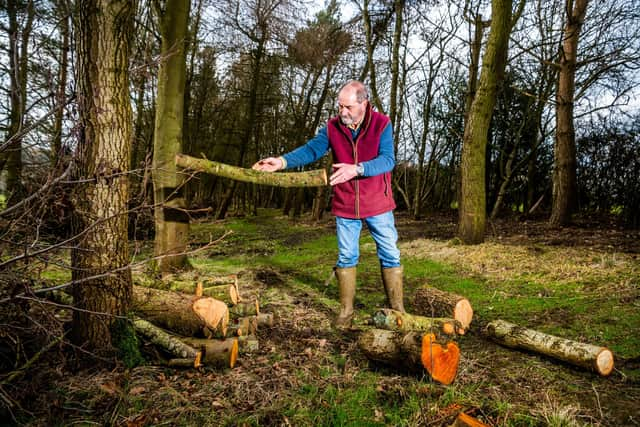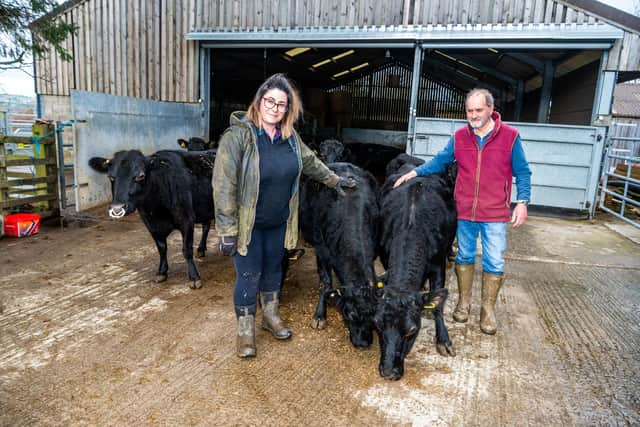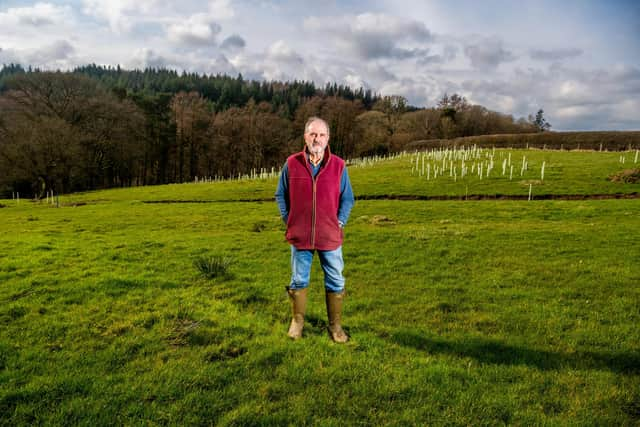Farm of the Week: Fresh start for North York Moors family with conservation farm and speciality cheese business
The move to pedigree Dexters, having previously reared Aberdeen Angus successfully on the 95-acre farm they purchased 37 years ago, came through their daughter Sara’s drive for producing a unique cheese.
Chris says he’s happy to be back farming cattle, is enjoying growing the herd and that they are now working their way towards that goal of using the Dexter’s dual-purpose ability.
Advertisement
Hide AdAdvertisement
Hide Ad“We are mainly back in cattle because our family was showing an interest, specifically our daughter Sara, who’d asked why we no longer had stock on the farm and that she’d like to get involved.


“We decided we’d go into Dexters this time because Sara was interested in dual-purpose cattle. Sara had worked for Paxton & Whitfield Cheese Co in London, has always had an interest specifically in cheeses and wanted to produce something special. That’s our target, to produce cheese from milking a small herd of Dexter cattle.
“Clare and I had quit keeping livestock when we’d hit 60 thinking we’d travel. We have a house in Switzerland that we have developed, visit regularly, as well as letting it out, but circumstances change.
“We wanted to do this for our family, as well as for ourselves, and having chatted everything through we decided we’d start again.
Advertisement
Hide AdAdvertisement
Hide Ad“All that Clare and I have said is that we’re too old now to take up with milking cows and getting involved in that side of it, but otherwise I’m very happy to build up the Dexter herd which we’re currently in the process of doing, and we’ve now reached 14 females.


“We are targeting about 20 breeding females, which was what we had with our Angus herd. I like farming, I like being with them and we’ve already started selling Dexter Beef. Last year we sold four beasts through The Grid Iron Meat Company and we understand some of that ended up in Michelin star restaurants.”
Chris also found that not even 100 yards away from Orchard Farm, Goathland’s award-winning new restaurant The Homestead Kitchen had Yorkshire Dexter sirloin on their menu at Christmas.
“Grid Iron air dry the beef, hang it for a long time and supply a lot of fantastic places in London, but to have our Dexter beef being served locally in the village through such a superb restaurant was just great.”
Advertisement
Hide AdAdvertisement
Hide AdChris says the prospective time period before starting a micro dairy with the Dexter herd is around two to three years, but that it may have been a smidgen earlier if their breeding plan had gone as they’d hoped.


“This is our third year since we came back into cattle when buying our first Dexters. We tried AI-ing the herd two years ago but it proved a total failure and set us back a year.
“Since then we have bought a little Dexter bull from the West Coast of Scotland. He’s of the Woodmagic bloodline, which is a renowned Dexter family that a lot of people don’t want because of their reputation for being quite small.
“What is important to us is that they come from that dual-purpose background and were farmed for milk as well as beef. He performed brilliantly last year with 100 per cent calving from his work with the herd. Calving of this year’s crop has just started.”
Advertisement
Hide AdAdvertisement
Hide AdSheep made their comeback prior to the cattle when Chris and Clare took on a few Coloured Ryeland sheep for their grandchildren and then bought a few Mules, but Chris says he and Clare are now paring that down to what are now known as their Murkesk Ryelands. The decision partly driven by weather and stock accommodation.
“This winter has been a nightmare. We’re on very heavy clay and the land is totally waterlogged. We’ve sold the bulk of our more commercial sheep because we couldn’t keep them on the land and haven’t the farm building space.
“We’ve a few lambs left we’re going to hang on to and sell them in the breeding sheep sales next autumn. We’ve built up a nucleus of 10 Ryeland ewes and we will build up to 20.”
Chris and Clare have been committed to a regenerative approach since before the term was in vogue and species-rich grasses, replanting of hedgerows, planting new woodland, carbon sequestration and producing 100 per cent grass-reared beef are all part of their farming DNA.
Advertisement
Hide AdAdvertisement
Hide Ad“When we bought Orchard Farm it was ranched effectively, but just all in one big open area. Nearly all of the fences and hedges had gone and those hedges that remained were 30-40 ft high with bare fronts and a little bit of greenery at the top.
“As soon as we’d bought it we’d got in touch with the North York Moors National Park and they helped us with our first conservation scheme which was the start of the restoration of the land. We planted a lot of new woodland, put all the hedges back as they appear on the 1850 Ordnance Survey map, apart from one hedge, and so we have very little fields, which would be totally impractical from a modern farming point of view.
“We’ve a lot of SSSI on the farm. We’ve been in countryside stewardship schemes for years and we are currently working with the National Park over various schemes under their Farming in Protected Landscapes initiative.”
Chris is from Durham originally, had grown up on large agricultural estates in Wales and Scotland and had seen himself moving into farming when younger, having worked on farms in his youth, but found his career as an architect, starting in London and then South Yorkshire. He and Clare moved to Goathland when a neighbour of his mother, who lived in Beck Hole, told him Orchard Farm was up for sale.
Advertisement
Hide AdAdvertisement
Hide Ad“I always wanted a conservation farm. We pride ourselves on having up to 80 species of birds with curlews here every spring. I have also established a once-a-year shoot. We have quite a lot of wild pheasant, it is very much conservation led.
“Years ago I saw this as our retreat, but we now share what we do with our guests from our three holiday accommodations giving full access to the farm. Our daughters Sara and Emma are both involved and are also looking to start getting involved with farm education.”